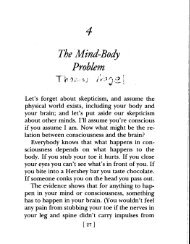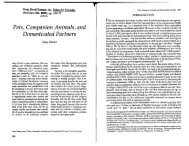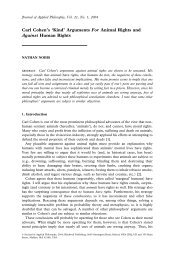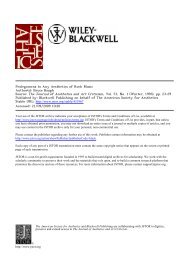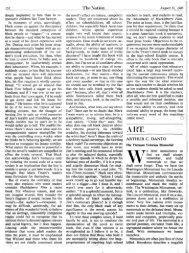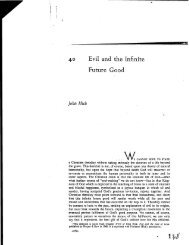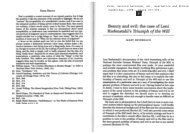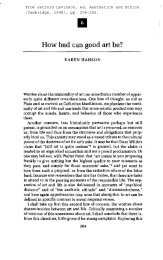36 Environmental disobedience - Ned Hettinger
36 Environmental disobedience - Ned Hettinger
36 Environmental disobedience - Ned Hettinger
Create successful ePaper yourself
Turn your PDF publications into a flip-book with our unique Google optimized e-Paper software.
ENVIRONMENTAL DISOBEDIENCE 499homes be destroyed peacefully when local authorities grant logging rights to foreigntimber companies for a percentage of the profits. Legal obligations (what the lawdemands) and moral obligations (what valid moral principles require) are conceptuallydistinct and it is not plausible that legal obligations invariably outweigh conflictingmoral obligations. One might restrict absolute legalism to Significantly justsocieties. On this view, the Penan may rightly resist the illegitimate laws of theircorrupt local government, but Earth First! members in western democracies mustobey the environmental laws they oppose.Although the legitimacy of legislative institutions is an important factor in determiningthe moral force of resulting laws, even laws issuing from democratic politicalinstitutions need not invariably be obeyed. For example, it would seem to be acceptableto destroy another's property to prevent the spread of fire or to avert a chemicalexplosion at a factory near neighborhoods. It may also be morally permissible todisobey laws sanctioned by a democratic majority when they clearly violate minorityrights. That a society is a substantially just democracy is no guarantee that all of itslaws have sufficient moral legitimacy to outweigh countervailing moral concerns inall circumstances.Not only should we reject the idea that democratically sanctioned law must alwaysbe obeyed, but we should also reject the opposing extreme that law qua law (includingdemocratically sanctioned law) has no moral claim on us. In arguing for theindependence of moral conscience from political obligation. Thoreau says: "It is notdesirable to cultivate respect for law. so much as for the right. The only obligationwhich I have a right to assume, is to do at any time what I think is right" (1991[1849]. p. 29). Martin Luther King (1929-68), the great crusader for civil rights forAfrican-Americans. appears to accept the more limited view that morally deficientlaws (rather than all laws) lack moral weight. Responding to the charge of inconsistencyin demanding that white segregationists obey laws requiring integration ofschools. while encouraging Blacks to ignore remaining segregationist laws. hewrote, "There are two types of laws; there are just and there are unjust laws. Iwould agree with Saint Augustine that 'An unjust law is no law at all'" (1991[1963]. p. 73).The suggestion is that bad laws (or all laws) lack moral weight entirely. But thismakes the fact that an act breaks the law morally irrelevant. A more reasonableapproach grants that laws (including bad laws) have moral weight, but makes theobligation to obey them "prima facie," i.e.. override able by stronger moral considerations.On this view. sometimes a person can be morally required to obey morallydeficient laws. Even when a person is morally justified in violating a law. some moralforce must be overcome. One implication is that environmental disobedients cannotsimply refer to the putative injustice or moral deficiencies of a particular law to justifytheir illegal behavior.The ground for this prima facie obligation to obey the law in a substantially justsociety is a subject oflong-standing and ongoing philosophical controversy. In Plato'sCrito. Socrates (470-399 BCE) argues that just as we should be loyal and obedient toour parents because of all they have done for us. so too we owe a duty of loyalty andobedience to the state out of gratitude for its far greater provision of benefits.Typically, environmental activists have benefited from modern states and thus mayI ifI I






